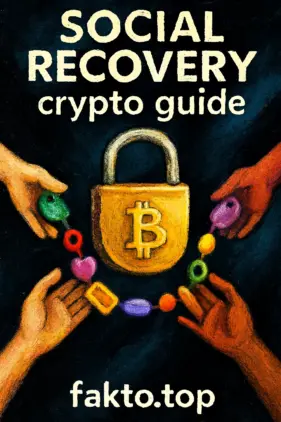Account Abstraction: Pay Gas in USDC & Ditch Seed Phrases
Account Abstraction: The End of Gas Fee Nightmares and Lost Seed Phrases?
Are you tired of begging for ETH every time you switch L2 networks? Frustrated by the constant threat of losing your seed phrase and everything in your wallet? For years, these two issues—gas fees and single points of failure—have haunted Web3 users. But what if there was a way to pay gas in USDC, skip worrying about seed phrases, and finally enjoy smooth, fee-free crypto transactions? Enter Account Abstraction (AA), the paradigm shift that transforms ordinary wallets into Smart Wallets, making your crypto life simpler, safer, and more flexible.

In this article, we’ll dive into how Smart Wallets powered by EIP-4337 solve these persistent Web3 UX problems. From Gas Sponsorship to Social Recovery and batched transactions, you’ll see why AA isn’t just a buzzword—it’s the immediate solution for advanced beginners and intermediate crypto users looking for practical fixes.
| Feature | EOA (MetaMask) | Smart Wallet (AA) |
|---|---|---|
| Gas Payment | ETH only | Pay in USDC or any supported token via Paymaster |
| Recovery | Single seed phrase (SPOF) | Social Recovery using Guardians, modular and secure |
| Transaction Type | Single operations only | Batched Transactions: approve, swap, stake in one click |
The Paymaster Revolution: Paying Fees in USDC
Imagine opening a DApp on zkSync or Arbitrum for the first time, ready to swap tokens or stake assets, and suddenly realizing you don’t have any ETH for gas. Frustrating, right? This has been a persistent pain point for Web3 users—needing ETH just to cover transaction fees. But Account Abstraction (AA) changes everything with the Paymaster function, enabling zero gas fee crypto transactions in your preferred token.
So, how does it work? The Paymaster acts as a bridge between your Smart Wallet and the blockchain. When you initiate a transaction, the Paymaster steps in, paying the required ETH gas on your behalf, while simultaneously accepting payment in USDC or other supported tokens. In other words, you no longer need to hold ETH just to interact with L2 networks—AA allows you to pay gas in USDC seamlessly.

Consider this real-world example: a new user wants to participate in a promotion on a zkSync-based DApp. Normally, they would need ETH to cover the transaction fee, but with a Smart Wallet using a Paymaster, the DApp can sponsor the gas cost directly. The Paymaster executes the atomic swap, converting USDC from the user’s wallet into ETH for gas in a single transaction. This is what Gas Sponsorship crypto is all about—removing barriers and smoothing the onboarding experience for Web3 users.
Why is this revolutionary? Beyond convenience, it opens the door for advanced strategies like batch transactions and multi-step operations without worrying about gas logistics. For instance, a user could approve a token, swap it, and stake the resulting assets in one click—all with the transaction fee handled by the Paymaster. This not only improves UX but also positions Smart Wallets as a clear upgrade over traditional EOAs like MetaMask, which require manual ETH top-ups.
Moreover, the Paymaster function can be customized. Projects can choose whether to subsidize fees for new users, reward loyal participants, or implement selective sponsorship strategies. This flexibility transforms user acquisition, making it far easier to attract and retain participants without forcing them to manage ETH balances. The AA model is also fully compatible with L2 scaling solutions like Arbitrum, enabling frictionless, cost-efficient interactions across multiple chains.
Some skeptics might ask: “Doesn’t letting someone else pay gas open security risks?” In reality, Paymasters operate through Entry Point contracts with strict rules and validations. The transaction is executed atomically, meaning the Paymaster only covers gas if the user operation is valid. This preserves decentralization while offering practical UX improvements.
In short, Smart Wallets with Paymaster functions redefine how we think about gas payments. You can finally interact with DApps on zkSync or Arbitrum without worrying about ETH, enjoy zero gas fee crypto transactions, and focus on the financial actions that matter—swaps, staking, and liquidity provision. AA doesn’t just solve a technical problem; it removes a psychological barrier that has kept mainstream users out of Web3.
By enabling users to pay gas in USDC and offering sponsorship models, Account Abstraction transforms crypto wallets from a frustrating bottleneck into an empowering tool. This is how AA turns a historically clunky process into a smooth, frictionless experience, making Smart Wallets the obvious choice over traditional EOAs like MetaMask.
Security Triumphs: 
One of the most stressful parts of using crypto has always been managing your seed phrase. Lose it, and your funds are gone forever. Traditional EOAs like MetaMask rely entirely on this single point of failure (SPOF), leaving users vulnerable to mistakes, phishing, or simple forgetfulness.
Enter Smart Wallets powered by Account Abstraction, which introduce a safer and more flexible approach through Social Recovery crypto guide mechanisms.
Social Recovery allows you to assign trusted individuals or devices—called Guardians—who can help restore access to your wallet if your private key or seed phrase is lost. Instead of one fragile key, your wallet operates as a modular security system. For instance, if you lose access to your device, a combination of Guardian approvals can recover your funds securely. This preserves self-custody while mitigating the risk of permanent loss.
How does this differ from traditional wallets? With a MetaMask EOA, losing your seed phrase is catastrophic. With a Smart Wallet, it’s an inconvenience, easily managed through decentralized contract logic. Each Guardian approval is recorded on-chain, and the recovery process is fully auditable. Your funds remain in your control, not held by a centralized service.
Some skeptics ask, “Isn’t Social Recovery just another form of centralization?” The answer is a clear no. While the system involves trusted parties, the recovery process is governed by the wallet’s smart contract. There’s no central authority that can arbitrarily access your funds—the rules are encoded on-chain, fully transparent, and enforceable.
Let’s break down a practical example: You use a Smart Wallet on Arbitrum and assign three Guardians—two friends and one hardware device. If you lose access to your wallet, any two of the three Guardians can approve the recovery transaction. The wallet’s smart contract validates these approvals and restores access without ever exposing your private key. It’s simple, secure, and dramatically reduces the risk of losing assets compared to EOAs.
In addition to Social Recovery, Smart Wallets also integrate with Bundler and Entry Point contracts to streamline security alongside UX improvements. Batched transactions reduce the number of operations needed, meaning fewer opportunities for error or accidental exposure. Approve, swap, and stake—all in one operation—while maintaining strong recovery safeguards.
By combining Paymaster-driven gas flexibility and Social Recovery, Account Abstraction eliminates the two biggest UX nightmares: worrying about ETH for fees and losing your seed phrase. Smart Wallets give you freedom and peace of mind, turning what was once a source of stress into an empowering experience for users at all levels.
The result? You can finally navigate Web3 confidently, knowing that your assets are protected by a decentralized, secure, and user-friendly system. No more sleepless nights over lost seed phrases—AA ensures that your wallet is resilient, adaptable, and ready for modern crypto life.
The Technical Engine: Bundlers and Batched Transactions
While Paymasters solve the gas problem and Social Recovery protects your funds, the real power of Account Abstraction lies in its technical engine: Bundlers and Entry Point contracts. Think of Bundlers as the operators that gather user transactions, validate them, and submit them to the blockchain efficiently. This system allows Smart Wallets to execute multiple actions in a single atomic transaction, which is a massive UX win compared to traditional EOAs like MetaMask.

Batched Transactions are a direct benefit of this architecture. Imagine approving a token, swapping it, and staking the result—all with a single click. Traditionally, each step would require its own transaction, costing additional gas and time. With AA, the Bundler collects these operations, processes them together, and ensures they execute atomically. The Entry Point contract enforces rules, validates the user operation, and interacts with the Paymaster if gas needs to be covered. This integration creates a seamless experience for the user, enabling Smart Wallet vs MetaMask advantages in practice.
Here’s a breakdown of the main components you should understand:
| Component | Description |
|---|---|
| User Operation | The transaction request from a Smart Wallet, which can include multiple actions like approve, swap, and stake. |
| Bundler | Collects User Operations, validates them, and submits them as a single transaction to the blockchain. |
| Paymaster | Pays gas fees on behalf of the user, allowing payments in alternative tokens like USDC. |
| Entry Point | Smart contract that enforces rules, validates User Operations, and coordinates between Bundler and Paymaster. |
The result of this system is a dramatic reduction in friction. No more juggling multiple transactions, worrying about gas, or manually approving every step. AA enables advanced beginners and intermediate users to interact with complex DeFi strategies effortlessly. By leveraging Batched Transactions, Smart Wallets turn traditionally tedious operations into a single, streamlined experience.
Importantly, the architecture also enhances security. Since Bundlers and Entry Point contracts handle validation, the risk of accidental loss or misexecution is minimized. Combined with Social Recovery, this means you not only enjoy a smoother UX but also robust safety for your assets. This is why Smart Wallets with AA features are becoming the preferred choice for users looking to experience zero gas fee crypto transactions while maintaining full self-custody.
Ultimately, the technical engine behind Account Abstraction transforms Web3 interactions. By integrating Bundlers, Entry Point contracts, Paymasters, and Batched Transactions, Smart Wallets deliver the flexibility, security, and usability that EOAs cannot match. For anyone tired of managing ETH for gas and worried about seed phrases, AA provides a clear, practical solution.
Practical Adoption Roadmap
Now that you understand the mechanics and benefits of Account Abstraction, the next step is knowing where and how to adopt it. Not all networks and wallets support Smart Wallets fully yet, but several leading L2 solutions are paving the way for practical use.
zkSync and Arbitrum are currently among the most active L2 networks implementing AA features. Both provide support for Paymaster functions, enabling you to pay gas in USDC and experience zero gas fee crypto transactions. They also offer robust infrastructure for Bundlers and Entry Point contracts, ensuring your Smart Wallet transactions are processed efficiently and securely.
When it comes to choosing a Smart Wallet, focus on wallets with proven support for AA features. Argent and Safe are standout options. Argent offers a user-friendly Social Recovery system and integrated Paymaster support, while Safe excels in multi-signature setups and batched transactions. Both wallets remove the dependency on a single seed phrase, improving security without compromising self-custody.
However, there are critical considerations. Paymasters, while incredibly convenient, can introduce centralization risks if mismanaged. Some projects may limit gas sponsorships to certain users, creating potential inequalities in access. Additionally, poorly designed Paymaster contracts could theoretically be exploited, though reputable L2 networks mitigate these risks through thorough audits and decentralized validation. Users should remain cautious and choose wallets and networks with strong track records.
Adopting Smart Wallets also involves understanding the user operation lifecycle. Each action you perform—whether approving tokens, swapping assets, or staking—interacts with the Bundler and Entry Point system. Knowing this helps you anticipate transaction outcomes, track gas payments, and ensure security remains intact.
In practice, start small. Deploy a Smart Wallet on zkSync or Arbitrum, experiment with low-value transactions, and explore features like Social Recovery and batched operations. Over time, you can scale your usage confidently, benefiting from simplified gas payments, enhanced security, and the flexibility that traditional EOAs like MetaMask simply cannot offer.
By following this roadmap, advanced beginners and intermediate users can fully leverage Account Abstraction, turning Smart Wallets from an experimental concept into a practical, everyday tool. AA is no longer theoretical—it’s the future of Web3 user experience.
Conclusion
Account Abstraction is more than a technical upgrade—it’s the bridge to mass adoption in Web3. By enabling Smart Wallets with Paymaster-driven gas flexibility, Social Recovery, and batched transactions, AA removes the two biggest obstacles users face: high gas fees and the single point of failure from seed phrases. Networks like zkSync and Arbitrum along with wallets such as Argent and Safe make it practical and secure for real-world use. Don’t wait—experience the freedom, security, and convenience of a Smart Wallet today, and step into the fee-free, worry-free future of crypto.
Disclaimer
The content in this article is for informational and educational purposes only and does not constitute financial, investment, or legal advice. Using Smart Wallets, L2 networks, and Account Abstraction features involves risks, including potential loss of funds. Always conduct your own research, verify sources, and use caution when interacting with crypto platforms. Neither the author nor any affiliated parties are responsible for your transactions, investment decisions, or outcomes resulting from using the described technologies.
Tired of high gas fees and worrying about lost seed phrases? Discover how Account Abstraction and Smart Wallets like Argent and Safe let you pay gas in USDC, use Social Recovery, and enjoy batched transactions on zkSync and Arbitrum. Learn how Paymaster, Bundler, and Entry Point contracts make zero gas fee crypto transactions practical and secure.
